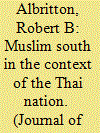| Srl | Item |
| 1 |
ID:
094421


|
|
|
|
|
| Publication |
2010.
|
| Summary/Abstract |
The years since 2004 have been marked by a level of insurgency in the southern region of Thailand unknown for decades. An accurate perspective on this conflict requires a deeper understanding of differences between the Buddhist and Muslim Thais of the region than has been evident in public and academic discourse. This study utilizes data from a survey taken in 2006, of attitudes and political orientations across all regions of Thailand, including an independent sample of the southern region. The data indicate that southerners are different from the rest of Thailand, whether Buddhist or Muslim; that Malay-speaking Muslims are different from other Muslims; and that sympathy for the insurgency lies not in religion, but in defending practices associated with loyalty to specific forms of Malay culture that characterize the region.
|
|
|
|
|
|
|
|
|
|
|
|
|
|
|
|
| 2 |
ID:
072727


|
|
|
|
|
| Publication |
2006.
|
| Summary/Abstract |
This paper explores the discrepancies between the official rhetoric on Malayness and the emerging discourse on national identity among the urban Malay (Melayu) youth of the Indonesian province Kepri. The population of the Riau Archipelago is multiethnic, with Malays as the majority and Kepulauan Riau represents an important historical centre for the whole Malay World. Because of this, local leaders have engaged this newly formed province in a series of attempts to revitalise a transnational ethnic awareness based on an inclusive Malay identity framework. However, most of the students I met during my recent fieldwork in Tanjung Pinang's public schools tend to reject most ideas of reinforcing the bridge with the Malays of neighbouring nations, and prefer to perceive themselves primarily as Indonesian. This should not come as a surprise. Since 1998, the popular culture scene has been largely influenced by reformasi movements all over Indonesia. For the Tanjung Pinang youth, urban Indonesia, represented especially by Jakarta, is synonymous with dynamism and democratisation, while Malaysia and Singapore are regarded as moralistic and patronising.
|
|
|
|
|
|
|
|
|
|
|
|
|
|
|
|